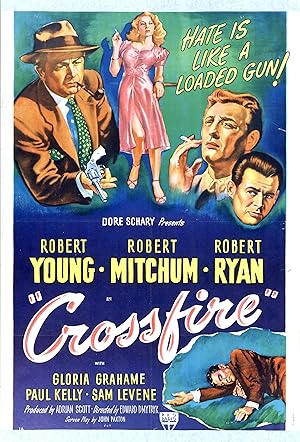Crossfire
| 1947Directed by: Edward Dmytryk
Main Plot
Crossfire follows a group of World War II veterans who reunite in a suburban neighborhood, where tensions arise after a brutal murder. The story centers on a detective investigating the case, which appears to be a hate crime against a Jewish man. As the detective delves deeper into the lives of the veterans, he uncovers the complexities of their relationships and the prejudices that linger from the war. The narrative explores themes of anti-Semitism, guilt, and the psychological scars left by combat. Through a series of flashbacks and interviews, the film reveals the impact of war on the soldiers and how their experiences shape their perceptions of others. The investigation not only seeks to uncover the truth behind the murder but also serves as a reflection on the broader societal issues of intolerance and the struggle for redemption in a post-war world.
Characters
- Robert Young plays Captain Finlay, a determined and insightful detective who unravels the mystery behind a murder motivated by prejudice, driving the film's exploration of social issues.
- Robert Mitchum plays Sergeant Peter Keeley, who investigates a murder involving anti-Semitism, uncovering the prejudices and tensions within a group of soldiers.
- Robert Ryan plays Montgomery, a bigoted ex-soldier whose hatred drives the murder investigation at the film's core, highlighting post-war societal tensions and prejudice.
Ending Explained
In the ending of Crossfire, the tension culminates as the investigation into a murder reveals deep-seated prejudices and the consequences of hatred. The main conflict centers around the murder of a Jewish man, which initially appears to be a random act of violence. However, as the detectives delve deeper, they uncover that the crime is rooted in anti-Semitism, highlighting the societal issues of bigotry and intolerance. The climax occurs when the true murderer is confronted, leading to a dramatic revelation about the motivations behind the crime. The detectives piece together the events of that fateful night, exposing the toxic influence of prejudice among the suspects. The resolution comes when the murderer is apprehended, and the narrative emphasizes the destructive nature of hate, suggesting that such ideologies can lead to tragic outcomes. Ultimately, the ending serves as a critique of societal attitudes, urging viewers to reflect on the impact of discrimination. The film closes on a somber note, reinforcing the message that understanding and acceptance are vital in overcoming the darkness of prejudice, thus connecting the resolution of the murder mystery to the broader themes of humanity and moral responsibility.
